Laravel vs Angular: Which Platform Is Best?
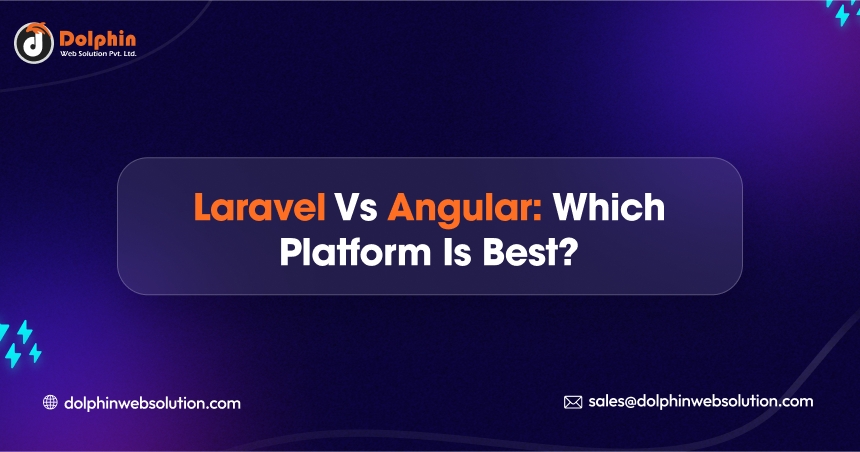
Table of Contents
Summary :
Examine the argument between Angular and Laravel in our most recent blog post, which compares these two potent frameworks. Discover the advantages and disadvantages of each to help you make the best selection possible for your website's development.
Introduction
In the development battle, which platform wins out? Is Angular’s skill at creating dynamic and responsive user interfaces more impressive than Laravel’s grace in server-side scripting? You can Hire Laravel Developers if you choose Laravel development. Come along for the ride as we examine the benefits, drawbacks, and subtle differences between Angular and Laravel to clear up any confusion and assist developers in coming to a conclusion that fits their development philosophy and project requirements.
What Is Laravel?
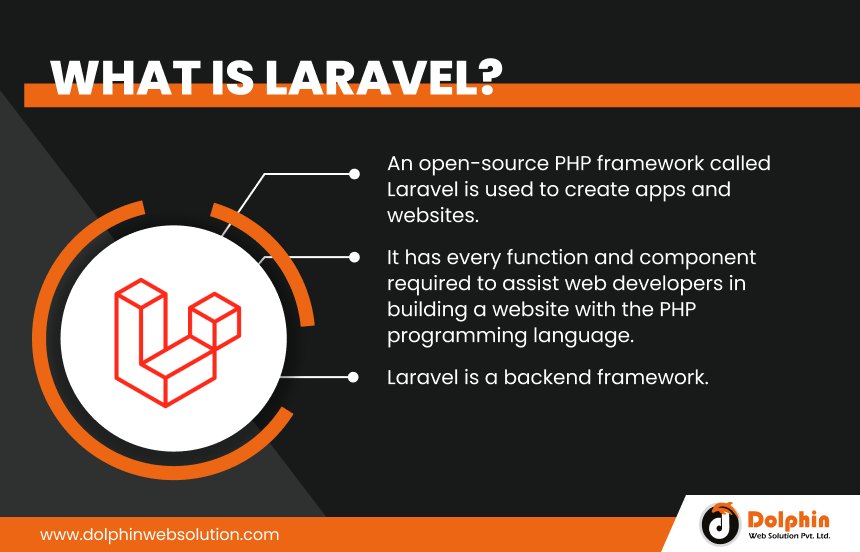
An open-source PHP framework called Laravel is used to create apps and websites. It has every function and component required to assist web developers in building a website with the PHP programming language. Laravel is a backend framework. Although it functions better with another front-end framework, it provides limited front-end capabilities regarding
You may rely on no-code website creators to construct anything essential, like an online store or portfolio. More than a no-code solution might be required if you are trying to develop something more sophisticated. Instead, pick a framework and begin developing code for it. As a simple-to-use, open-source framework for creating large-scale, contemporary online applications, Laravel development is a solid option.
Benefits Of Laravel For Web Development
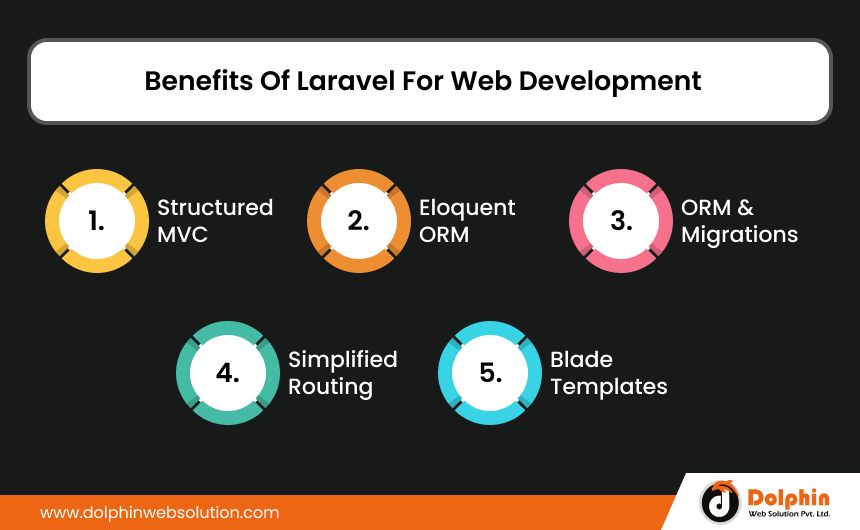
1. Structured MVC
For your website or web application, the Model-View-Controller architecture provides maximum efficiency and a multitude of functionality. Web developers benefit from a streamlined development process thanks to MVC, which divides the application functionality into components.
Designing and maintaining the Model, View, and Controller independently is possible. The MVC architecture offers many Views for a single Model, asynchronous development, improved performance, adequate documentation, and quick development speed. This feature facilitates the collaboration of several developers and makes error and bug detection easier. The MVC design is absent from most PHP frameworks, a significant factor in Laravel’s appeal.
2. Eloquent ORM
Eloquent ORM from Laravel is a powerful tool for database exchange. It facilitates connections between database tables and offers an intuitive user interface for database operations. Developers may write less code and concentrate more on the business logic of web development with Eloquent ORM.
3. ORM & Migrations
With its ORM (Object-Relational Mapping) architecture, Laravel enables simplified web development and a sophisticated means of interacting with databases. A crucial component of Laravel is migrations, which streamlines database schema management and makes version control and database sharing between development environments a breeze. This guarantees a smooth and effective workflow, improving teamwork and preserving database consistency through the web development process.
4. Simplified Routing
The routing engine built into Laravel makes it easier to manage incoming requests and create URLs by streamlining the design of application routes. This makes it possible to aggregate similar ways, bind route parameters, and inject middleware, all of which contribute to a neat and structured method of constructing application endpoints.
5. Blade Templates
The Blade templating engine from Laravel is an easy-to-use yet powerful tool for creating views in web development. It allows web developers to create reusable templates that can be used for other application pages. It helps create a streamlined and uniform user interface.
What Is Angular?
Based on TypeScript, Angular is an open-source framework for web applications. It completes various web development tasks and enhances the application or website by adding the necessary features. Angular is compatible with desktop, web, and mobile platforms.
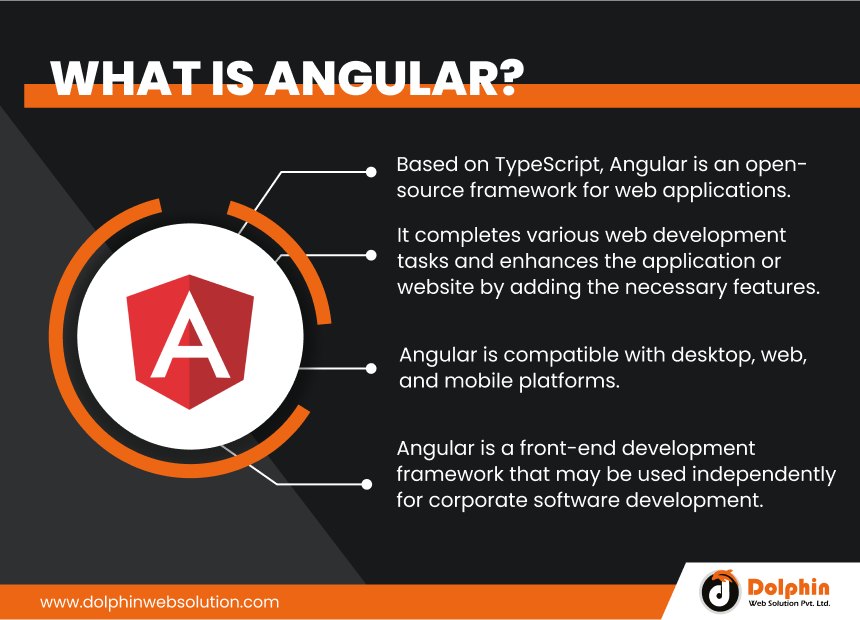
Angular is a front-end development framework that may be used independently for corporate software development. When a project calls for a feature-rich, multi-layered web application, Angular is the most suitable option.
It’s also important to mention that Angular has several tightly integrated libraries. They offer many options for developing functions, such as routing, form management, client-server communication tools, etc. Angular development is an excellent option for projects that must grow swiftly and effectively. A vast array of development tools and the component base offer endless possibilities for easy updates, good performance, and more.
Benefits Of Angular For Web Development
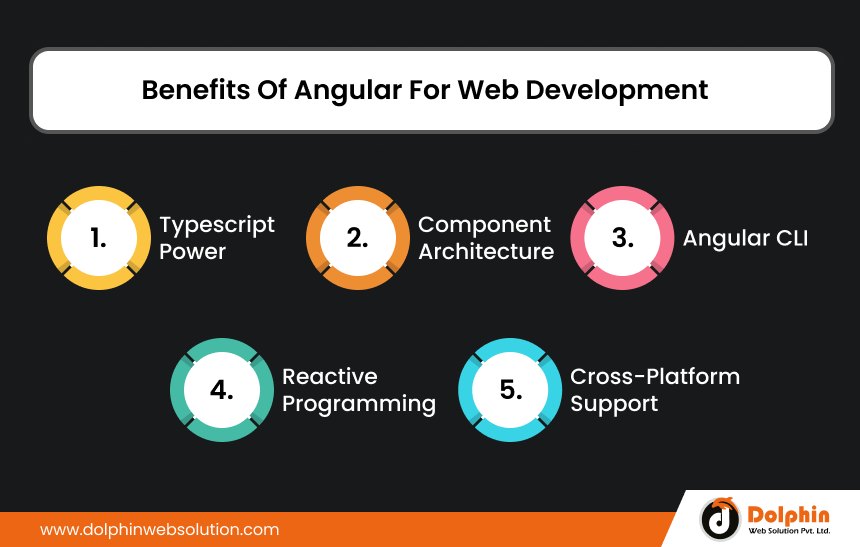
1. Typescript Power
Angular chose TypeScript as the primary programming language. JavaScript gains a great deal of syntactic sugar from TypeScript. We also benefit from various productivity advantages using TypeScript. We have access to powerful code assistance (IntelliSense). At the same time, we type in editors like VS Code and WebStorm, which facilitates the discovery of types, their features, and, most critically, frequent syntactical problems.
2. Component Architecture
Later versions of Angular employ component-based systems, which are significantly more straightforward to understand and write code. Say goodbye to complicated approaches. Angular divides the software user interface into separate, logical components and arranges them in a logical order. It is possible to condense similar-functioning elements into distinct segments. Because these are stand-alone parts, they may be used in various ways, making the development process more productive for developers.
3. Angular CLI
Angular CLI Streamlines development, testing, and deployment, boosting efficiency and adhering to best practices.
4. Reactive Programming
Reactive programming is embraced by Angular, making it possible to create data-driven, dynamic apps. By utilizing RxJS, Angular’s reactive methodology improves real-time updates. It makes it easier to handle asynchronous processes, all of which contribute to a dynamic and engaging web development experience for users.
5. Cross-Platform Support
Angular extends beyond web development. With frameworks like Ionic and Electron, it crafts cross-platform desktop and mobile apps, streamlining multi-platform app creation.
Laravel Vs Angular: A Detailed Comparison
Laravel Vs. Angular: Performance
Performance directly affects how quickly and responsive an app or website loads. High bounce rates, sluggish loading times, and a bad user experience can all be caused by poor performance.
Laravel
Laravel is well known for its exceptional ability to manage intricate server-side tasks. It offers a solid basis for high-performing applications with capabilities like Laravel Mix for asset compilation and Eloquent ORM for effective database interactions. Faster development is facilitated by its emphasis on simplicity and expressive syntax, while Laravel’s optimizations, such as opcode caching, guarantee effective PHP code execution.
Angular
When it comes to designing dynamic and responsive user interfaces, Angular shines. Through ahead-of-time (AOT) compilation, Angular converts templates into highly optimized JavaScript code, improving runtime speed dramatically. Reactive programming with RxJS improves efficiency even more and makes managing asynchronous actions more effective. Angular’s modular architecture makes the lazy loading of components possible, which reduces initial page load times and improves user experience overall.
Laravel Vs. Angular: Scalability
The ability to scale assesses a system’s capacity to manage expanding workloads or user counts. Scalability guarantees that the platform may grow without hiccups, avoiding performance bottlenecks during spikes in demand.
Laravel
Take advantage of a highly scalable design with Laravel that can easily handle significant traffic levels. It also becomes straightforward to scale Laravel apps horizontally by adding extra servers to your architecture.
Angular
Because JavaScript code is inherently sophisticated, growing Angular apps horizontally might be more complex than scaling Laravel applications.
Laravel Vs. Angular: Security
Security is essential for safeguarding user information, stopping illegal access, and maintaining the application’s integrity. Insufficient security protocols may result in compromised user data, breaches, and harm to the online or mobile application’s reputation.
Laravel
Pre-installed Security Features: Laravel prioritizes security by including features that guard against SQL injection, prevent Cross-Site Scripting (XSS), and hash passwords. Constructing safe apps is facilitated by the security aspects of the framework. Because of this, company owners prefer to use our Laravel development services to create their websites on Laravel for increased security.
Angular
Protection against Cross-Site Scripting (XSS): Angular has built-in capabilities like data binding and sanitation to thwart XSS attacks. The framework encourages developers to adhere to online security best practices and secure coding techniques.
Laravel Vs. Angular: Code Quality
Code quality reflects the underlying codebase’s dependability, efficiency, and maintainability. Code of the highest calibre minimizes errors, boosts efficiency, and makes it simpler for development teams to work together.
Laravel
The readability and beauty of code are highly valued in Laravel. Laravel promotes clean code with MVC and expressive syntax. Eloquent ORM simplifies database tasks, ensuring consistent and effective data management with frameworks like Ionic and Electron. Angular crafts versatile desktop and mobile apps. Develop once and deploy seamlessly across diverse platforms for organizational efficiency.
A lively community that actively supports coding standards and contributes to overall code quality and Laravel’s rich documentation demonstrates the framework’s dedication to producing clear and concise code.
Angular
Angular uses TypeScript, a static typing language that improves error detection and tooling during development, its code is of a high caliber. Because of its component-based architecture, Angular improves maintainability and scalability by encouraging code modularity and reusability. The framework maintains a distinct division of responsibilities, allowing services to handle business logic and components to handle certain UI aspects. This results in clean, understandable code. Angular is the go-to option for projects where code quality is of utmost importance because of its dedication to providing a stable testing environment that further guarantees the delivery of high-quality code.
Laravel Vs. Angular: Development Speed
The speed at which new features or upgrades may be introduced is determined by the development speed. Quicker releases might result from faster development, which will help the platform remain competitive and adjust to market demands.
Laravel
Laravel is praised for its ability to construct applications quickly. Laravel simplifies the development process and allows developers to create swiftly feature-rich apps because of its clear and expressive vocabulary. Composer’s broad ecosystem and pre-built packages make it easier for developers to integrate functions, cutting down on the required custom code. By automating tedious procedures and boosting the overall development pace, Laravel’s artisan command-line interface expedites development activities even more.
Angular
Because of its component-based and modular architecture, Angular provides a development environment with a rapid speed.TypeScript enhances development speed with static typing. Angular’s CLI simplifies project setup, letting developers focus on features, not designs. Furthermore, two-way data binding in Angular minimizes boilerplate code, allowing for quickly building dynamic and interactive user interfaces.
Laravel Vs. Angular: Ease Of Maintenance
Ease to Upkeep refers to the ease with which code may be found, corrected, or updated without causing a disturbance. Easy maintenance guarantees timely upgrades, effective troubleshooting, and a more sustainable development lifetime.
Laravel
Laravel places a high value on readability and simplicity, which makes web application maintenance easier. Code is naturally divided into digestible components when the MVC design is used, making changes and improvements more straightforward to implement without completely breaking the system. Everyday maintenance activities are automated by Laravel’s artisan command-line tools, and the framework’s comprehensive documentation guarantees that developers can effectively diagnose issues and make updates. Furthermore, Laravel’s vibrant community facilitates continual development and support, streamlining the maintenance process.
Angular
Angular is very maintainable because of its distinct division of responsibilities and modular design. Developers may isolate and update individual components of an application without impacting the entire codebase because of the component-based design. Static typing in TypeScript improves code stability by lowering the possibility of mistakes during maintenance. Regular maintenance duties are made more accessible by Angular’s CLI, and new developers may quickly grasp and contribute to projects because of its well-established norms. For applications that need continuous support and upgrades, Angular provides a solid framework emphasizing scalable and maintainable code.
Laravel Vs. Angular: Community Support
Community Support is the presence of outside resources, discussion boards, and developer community support. Strong community support accelerates growth by fostering problem-solving and knowledge exchange through pooled resources and skills.
Laravel
Vibrant and Active Community: Laravel has a very active community. The ecosystem is made richer by community-driven packages like Laravel Mix, Laravel Forge, and others. Angular
Angular
Supported by Google: Angular has the advantage of having a robust community due to Google’s development and upkeep. The official documentation is comprehensive, and the framework is often updated to improve functionality.
Laravel Vs Angular: Which One Is Best For Your Business
With all of AngularJS’s capabilities and advantages, switching to this application development method makes sense for developers. It provides efficient and successful strategies for creating web architectures and creates win-win situations for clients and angular developers worldwide. But Laravel is a good option to create an e-commerce website. Laravel is an open-source framework in contrast to specific other frameworks that are out there. For projects with little budgets, Laravel is a viable option. A premium option that works well for dynamic websites is AngularJS.
Conclusion
Angular and Laravel excel in web development. Laravel, a PHP framework, emphasizes simplicity and user-friendly tools. Angular, a JavaScript framework, offers robust capabilities but has a steeper learning curve. Both have strengths and trade-offs. Angular excels at handling sophisticated application development, whereas Laravel excels at simplicity. Active and encouraging developer communities are a feature of both frameworks that aid their ongoing development. The choice between Angular and Laravel ultimately comes down to the project’s specific needs, web development service cost and the development team’s experience.

Hello!
Click one of our contacts below to chat on WhatsApp

